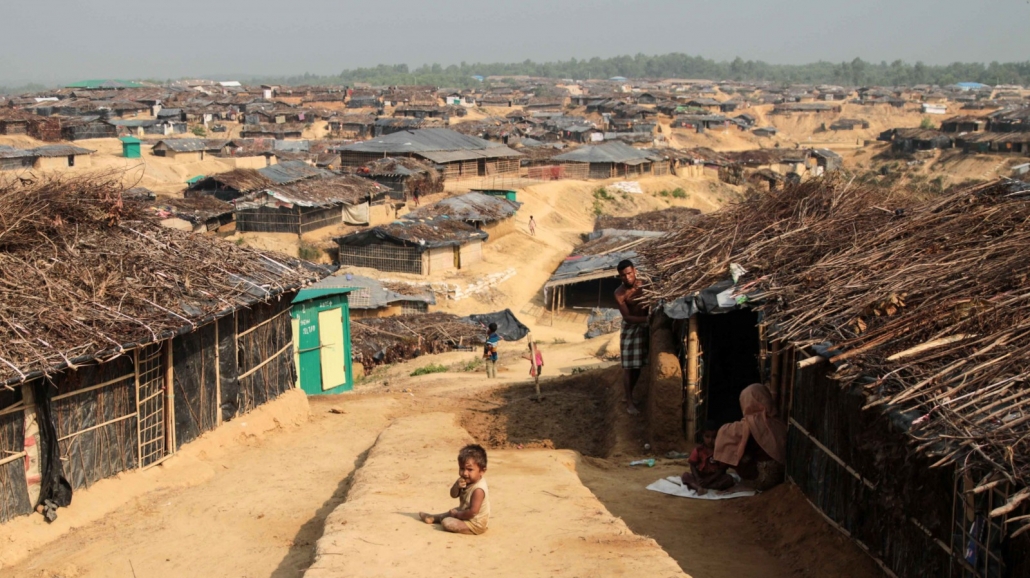
Kutupalong Refugee Camp in Myanmar. Photo courtesy of John Owens – Wikimedia Commons.
By Jane Johnston, Circle of Blue
Health experts and humanitarian organizations fear that an outbreak of Covid-19 inside the world’s refugee camps could threaten global containment efforts and be a death sentence for thousands of the world’s most vulnerable people.
Some 10 percent of the world’s nearly 26 million refugees live in refugee camps. These camps are designed to provide short-term homes for displaced people to receive basic services like medical care, food, water, and shelter. But temporary stays can drag on for years, and sanitary conditions can be abysmal: crowded and without running water, hand sanitation, or adequate shelter.
It’s an environment ripe for the spread of disease, experts and those who live there warn.
“If it’s killing people daily in America, then what do you think will happen to us? We will all perish,” Mariam Abdi, a vegetable vendor in Kenya’s Dadaab Refugee Complex, told the Associated Press. Dadaab’s three camps host over 200,000 Somalian refugees, according to the United Nations High Commissioner for Refugees (UNHCR).
“There is a serious risk of the virus spreading rapidly across these communities and UNHCR is sparing no effort to help and protect refugees and the internally displaced,” UNHCR External Relations Officer Marjanna Bergman wrote in an email to Circle of Blue.
“The potential impact of the virus can be magnified in conflict-affected countries. Particular attention is therefore given to countries where the pandemic is ‘an emergency on top of an emergency’, which include countries affected by the Syria situation,” Bergman said.
The exact number of refugees that have contracted the virus is unknown. Like many other places, testing kits are scarce. In the Idlib province in northwestern Syria, doctors reported treating patients with symptoms similar to Covid-19 as early as March, but the World Health Organization had not delivered the testing kits that would have confirmed those suspicions.
When WHO did send 5,900 tests to the Idlib province in late April, the number, it was only enough to test 0.15 percent of the population and were “carefully rationed” by authorities.
Bergman said this is the norm in low and middle income countries. “It will be important to test as many people as possible in line with national recommendations,” Bergman said. “However, current supplies and capacity are limited in many countries.”
Although governments have largely succeeded in isolating refugees from citizens in countries where cases have been reported, increased access to handwashing stations and necessities like soap continue to be scarce. Many people in the camps have to choose between washing their hands and bathing their children.
Where governments have fallen short, non-governmental organizations are trying to close these gaps. Aid agencies like the Red Cross, IRC and ALIGHT are among those who have installed handwashing stations and provided hard-to-come-by items like masks and gloves. Still, these aid agencies are calling on the international community for help.
“UNHCR urges donors to step up and support the humanitarian and development organizations as aid will be more important than ever after this crisis,” Bergman said, adding that governments need to do their part as well and “prepare and plan for the long run.”
Meanwhile, fear and anger among those living in the camps continues to grow. Protests inside the Vial camp on the Greek island of Chios last month resulted in a fire that left hundreds homeless.
While new cases in countries around the world begin to drop, the crisis in refugee camps may be just beginning.
“If the virus is allowed to spread,” Bergman said, “it could mean a generational setback to the lives and ambitions of refugees, internally displaced people and local communities.”
Jane is a Communications Associate for Circle of Blue. She writes The Stream and has covered domestic and international water issues for Circle of Blue. She is a recent graduate of Grand Valley State University, where she studied Multimedia Journalism and Women, Gender and Sexuality Studies. During her time at Grand Valley, she was the host of the Community Service Learning Center podcast Be the Change. Currently based in Grand Rapids, Michigan, Jane enjoys listening to music, reading and spending time outdoors.




